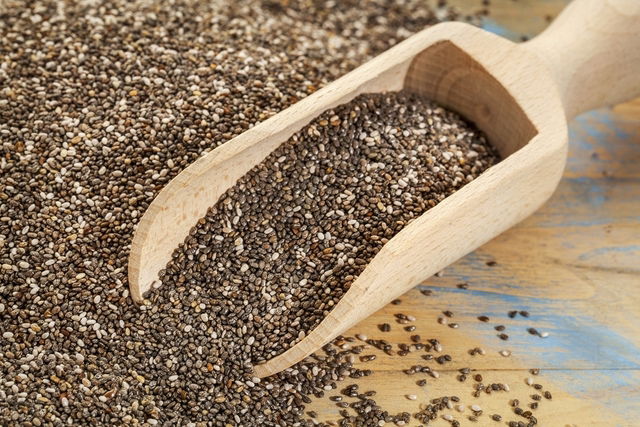Chia seeds are considered to be a superfood because they contain several diverse health benefits. Such benefits include improved intestinal flow, better cholesterol levels and better appetite control.
Chis seeds are made up of omega-3, antioxidants, calcium, protein, fiber, vitamins and minerals, which make this food source a great complement to many foods. They are natural and also a low-cost food option.
See the various health benefits that chia seeds can have below.

1. Diabetes control
Due to its high fiber content, chia seeds can help to prevent the quick rise in glucose that follows a meal, which will help to control blood sugar levels. This is a great therapeutic benefit for type 1 and type 2 diabetics. The high fiber content also helps to curb appetite, which can help with overeating.
2. Improved intestinal health
The high fiber content in chia seeds can also help with bowel movements, preventing constipation. To ensure this effect, chia seeds that are consumed should be soaked, as dry chia seeds can actually cause intestinal symptoms like gas pain.
3. Help with weight loss
Chia seeds absorb a great quantity of water in the body, and form a gel-like substance in the stomach, which can help reduce hunger and the urge to eat.
One recommended way to eat chia seeds is to make overnight oats. The ingredients are as follows: natural yogurt + 1 tablespoon of chia seeds + 1 tablespoon of oats + 1 teaspoon of honey. The ingredients can be placed in a mason jar or any glass jar overnight to be eaten for breakfast.
4. Reduce risk of cardiovascular disease
Chia seeds contain high levels of omega-3, which is beneficial for several reasons. Omega-3 helps to reduce inflammation in the body, control cholesterol levels, and prevent atherosclerosis (or hardening of arteries). Omega-3 also has a protective effective in the brain, and can help to improve memory and mood.
This nutrient is very important for brain function, as 60% of the brain is composed of fat. A deficiency of omega-3 in the diet is associated with memory loss in older adults, and with higher risk for anxiety and depression.
5. Prevent early aging
Chia seeds contain antioxidants which help to eliminate free radicals in the body, which can help with cellular aging. Antioxidants are substances that help to delay or prevent the action of free radicals on healthy cells. Free radicals can cause permanent damage and can lead to the development of illnesses like cancer, cataracts, cardiac problems, diabetes and even Alzheimers or Parkinsons. Alzheimer ou Parkinson.
6. Regulate cholesterol levels
Chia seeds contain high levels of insoluble fiber, which means they are not easily dissolvable in water. This allows chia seeds to help eliminate fat consumed from food naturally through the stool.
7. Strengthen the bones
Chia seeds are also a rich source of calcium, which helps to strengthen bones. They are especially indicated for people with a history of osteopenia, osteoporosis or a recent fracture, and can also be beneficial for those who are bedridden.
Benefits of chia seed oil
Chia seed oil is usually sold in capsules or in its natural liquid form. It also contains several health benefits, as it is rich in omega-3. Omega-3 is an essential fatty acid that has health benefits like strengthening the immune system, improving memory and concentration, reducing systemic inflammation, and preventing cardiovascular diseases like heart attacks.
To ensure a therapeutic effect, you should take 1 to 2 chia see oil capsules per day, or 1 tablespoon of chia seed oil liquid. The liquid can be added to healthy recipes, like bread, soup, desserts or stir-fries.
How to eat chia seeds
Chia seeds are a small seed that are very versatile an easy to use. You can eat them in the following ways:
- Add the seeds to your cake, pancake or cookie recipes
- Add the seeds to ready-to-eat foods like yogurt, soup, or salad
- Make an overnight pudding: 1 tablespoon of chia seeds mixed with 250ml (or 1 cup) of water. This can be consumed for breakfast or 20 minutes before any meal,
They can be purchased in flour or oil forms, and can be added to foods like yogurt, cereal, smoothies, cakes, salads and sauces. To ensure a therapeutic effect, you should consume 1 to 2 tablespoons of chia seeds per day.
Nutritional information
Nutritional composition of 100g of chia seeds
